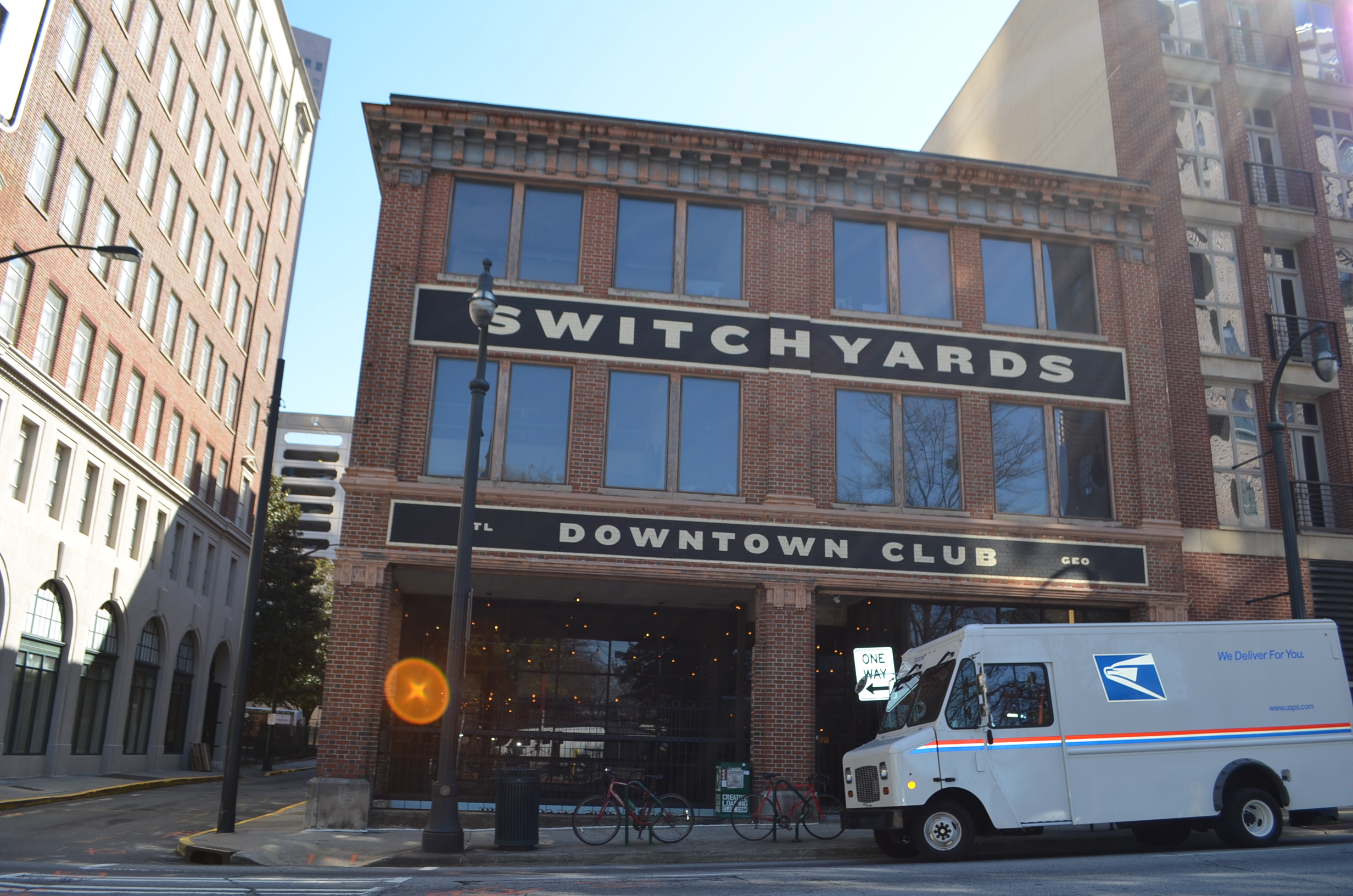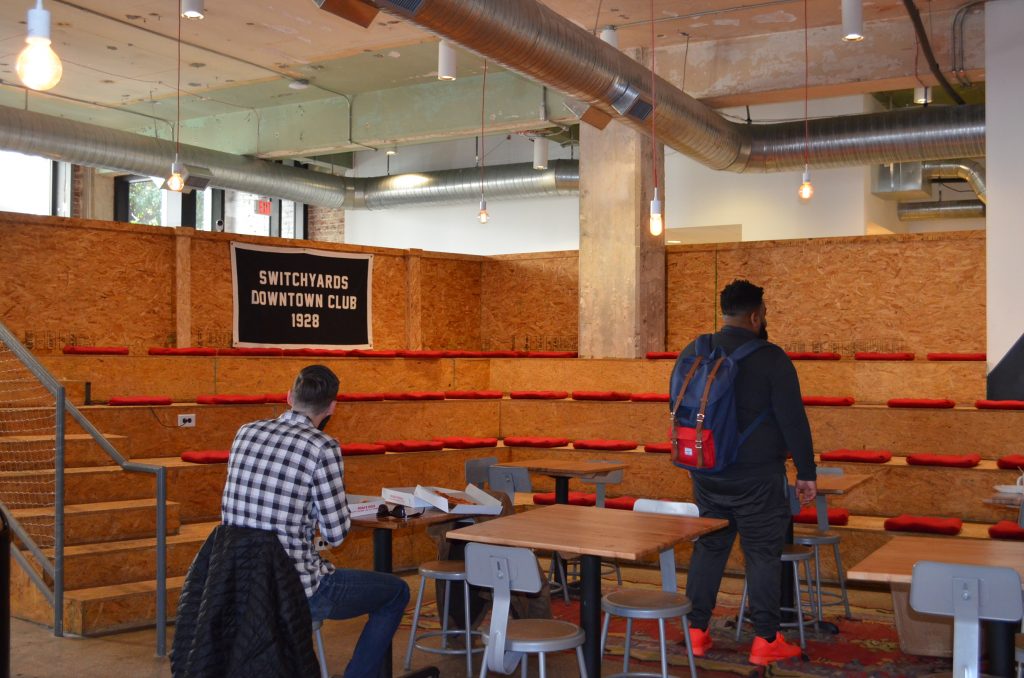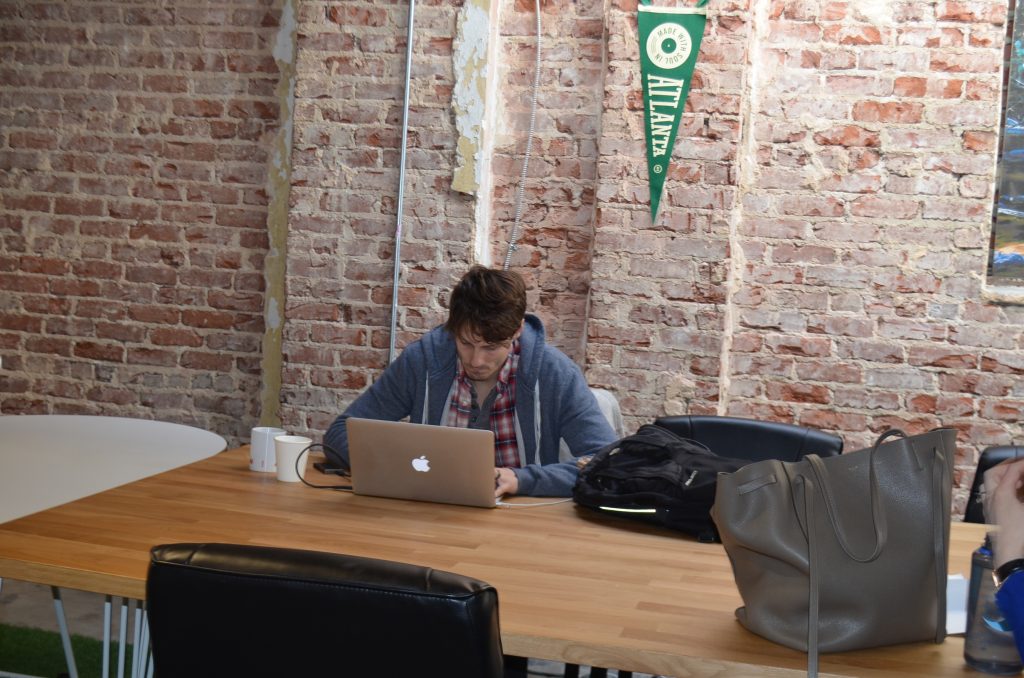Atlanta’s Co-Working Spaces Challenge Developers To Design Differently

The Switchyards Downtown Club first opened for business in January of 2016. It was named ‘Best Co-working Space’ in 2017 by Creative Loafing.
Tasnim Shamma / WABE
With more than two million square feet of co-working space in metro Atlanta, the metro area ranks among the top five markets for such space nationally.
These are offices that have flexible leases and come with amenities like arcade games, free food, and even nap rooms.
Shared office spaces account for just 1.5 percent of total office inventory in the Atlanta market, but it’s responsible for more than 60 percent of total office occupancy gains in Atlanta over the past 24 months, according to the commercial real estate firm JLL.
These co-working spaces are even changing the way traditional office developers in Atlanta develop, design and lease buildings.
Switchyards Downtown Club
The first thing that might catch your eye when enter the Switchyards Downtown Club is a wall lined with 395 white mugs – one for each person working there.
“You grab your mug, they’re in alphabetical order, you go up to the iPad to put in your order at front of the coffee shop and then the barista will fill it,” founder Michael Tavani said.

Tavani said the coffee is free and it’s just one perk. His brick-lined, four-story building was named the top co-working space of 2017 by Creative Loafing. But he considers Switchyards more of an incubator for start-up companies – particularly those looking to sell products or services to consumers.
“Some people think that co-working is all about ping-pong and the music and the amenities,” Tavani said. “None of those things are going to help a startup grow. We’re using a building to be a megaphone to produce consumer startup winners. Co-working is pretty different. It’s fractional office space. There’s no set goal on the growth of the company so you might have an attorney next to a real estate agent.”
Flexible Leases
Tavani said co-working is a popular choice for Atlanta startups, who may not know whether they’ll have funding next month.
He estimated there are at least 30 co-working spaces in Atlanta. International companies like Regus, Industrious and WeWork continue to expand and are even attracting more established companies.
“If I were the big Atlanta commercial real estate firms, I would be worried about what co-working is doing, because co-working is actually moving more and more upstream,” Tavani said. “WeWork is now signing companies like IBM. WeWork started off as a co-working space for startups in New York City. It’s now more about Fortune 500 companies than it is about startups.”
Scott Homa, senior vice president and director of U.S. Office Research at JLL, said one reason larger companies are purposely opting for the flexible setup and leases of co-working spaces is because office relocations are not as expensive as they were a decade ago.
“There’s not as much cumbersome infrastructure like file cabinets, copiers and fax machines,” Homa said. “Today, you basically just need a seat and a WiFi connection.”
Real Estate Gains
Homa said there’s now more than two million square feet of co-working space in Atlanta, but it’s just a small piece of the overall office rental market.
It’s responsible for more than half of new office leases in Atlanta in the past two years.

Homa said some of that business is coming from large corporations that want creative spaces and office design that co-working spaces have mastered, but, “a much larger share would be capturing a lot of users that may have been underserved by the traditional office market in the past.”
“By that I mean, work from home people or folks who would work out of a coffee shop or some other type of third place,” Homa said.
But per square foot, shared office spaces are generally more expensive than a traditional office lease. According to JLL, the average asking rent in metro Atlanta is $25.56 per square foot, while the average monthly cost of a coworking desk in Atlanta is $286. For a private office within a coworking space in Atlanta, the average cost is $519 per month.
‘Big Boy Space’
Nationally, JLL found a 181 percent premium on co-working spaces. It’s one reason why the co-working trend doesn’t worry Jennifer Koontz, the managing director for leasing and advisory services for the real estate developer Pope & Land. The company owns 16 traditional office buildings in metro Atlanta.
“When they’re more stable, they move into the typical office environment,” Koontz said. “People are willing to pay a little bit more for the flexibility, but I think eventually when they need more space, that’s when they move to, you know, big boy space.”
Design Changes
She said co-working tenants are essentially her future clients. But even Pope & Land is adapting to the co-working trend.
Koontz said Pope & Land has redesigned some common spaces like adding seats and tenant lounges in their lobbies.
“It is speaking more to how people are working differently than what we’ve thought before,” Koontz said. “They have the desk, then they might move to soft-seating area, and then have a huddle collaborative area at affects the interior buildout of office spaces as well as the amenities that we offer to buildings.”

CEO Scott Taylor said his firm Carter & Associates, is transforming traditional office building lobbies to mimic co-working spaces.
“We have in our 715 Peachtree building, a coffeehouse and a restaurant and all of our seating really is our lobby so it feels like almost a co-working environment,” Taylor said. “It’s more collaborative. It’s more casual.”
He said his 60-year-old company is even considering offering flexible lease terms, a hallmark of co-working spaces.
Wellness Certification
Michael Bull, CEO of Atlanta-based commercial real estate firm Bull Realty, said more employers are looking at office design to boost productivity.
“There’s a new wellness certification that you can get for your office space and I think that’s going to be the biggest thing moving forward so that you can increase productivity, recruiting, retention by creating a healthy environment for your employees,” Bull said.
“That’s going to be important whether you’re in a co-working, temporary space or you own your own building and you have thousands of employees. You can increase productivity through wellness factors: air, light, plants, food, exercise, furniture, and lighting. All these aspects combined can really change the productivity of employees and really increase bottom line numbers.”








